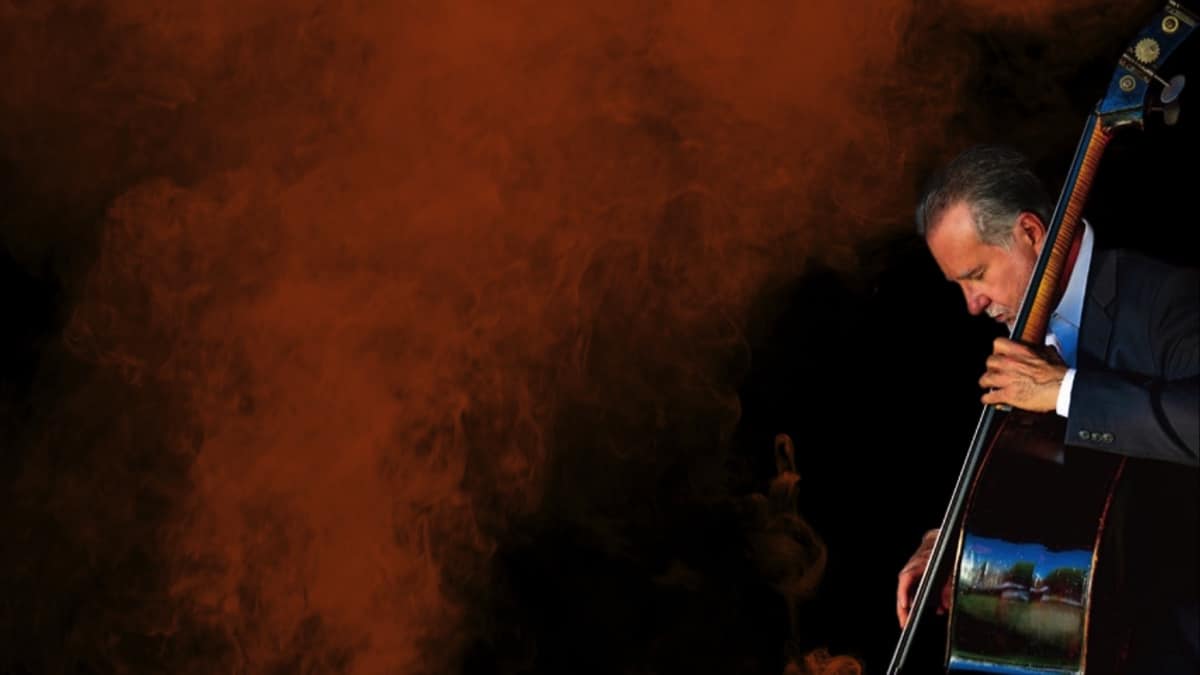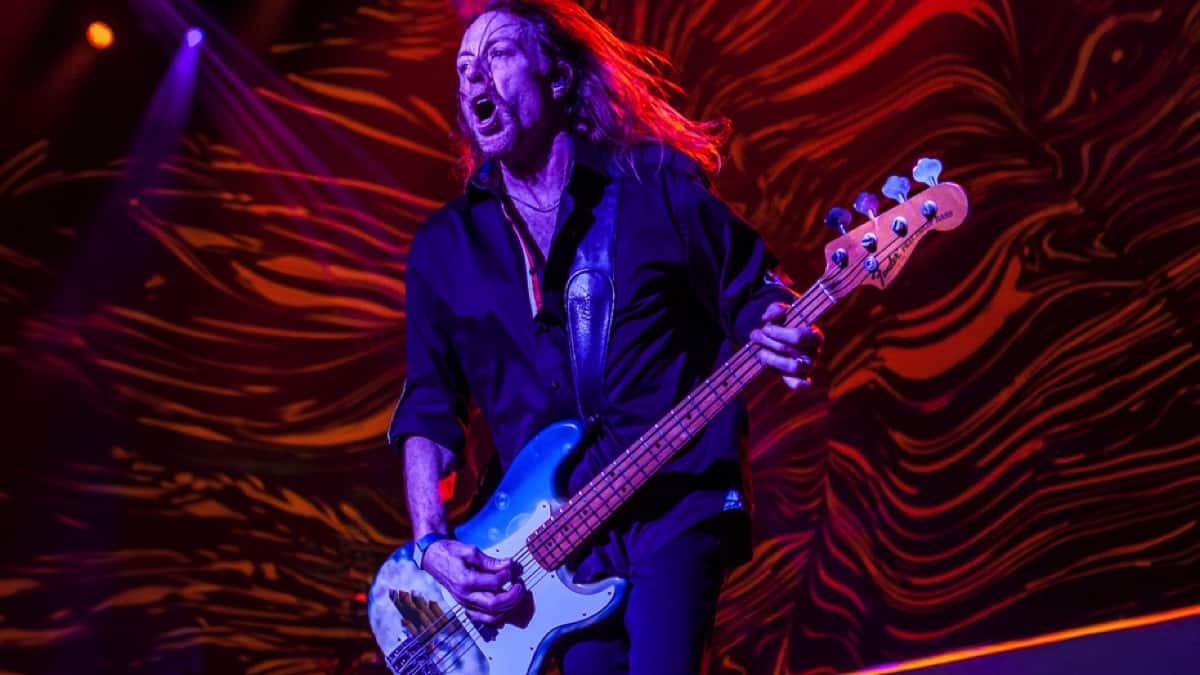Cover
Bass Musician Magazine: Dec/Jan 2009-2010 Issue Featuring Christian McBride

Jake: I know you’ve been writing some music for some big band projects coming up. Could you tell me a bit about your compositional process, and the complexities of writing for a big band, as well as a quintet?
Christian: They are definitely two different animals—I shouldn’t say two different animals, but the big band animal is obviously one that has more limbs. Instead of writing for an animal with just four arms, you have to write for an animal that has sixteen arms. For me, I was actually forced to write for a big band context, and in retrospect, I’m really glad that I was forced to do that. In the mid 90’s I got a commission from the Lincoln Center jazz orchestra to write a piece for their big band, and I remember thinking, I don’t write for a big band, why are they making me write a piece for a big band, I don’t want to do that. I didn’t know much about orchestration, putting different harmonies together, and counterpoint, all those things that big band writers knew…I didn’t know any of that. And basically, Winton Marsalis said, you better start learning, because you’re going to write for this big band whether you like it or not. Since then, I’ve been on this quest to really learn about writing for big band. It’s a lot of work—it’s very stressful, it’s very time consuming, not to mention that it seems that the history of big band writers all seem to have some kind of health aliment—high blood pressure, heart attack, and I thought why would anybody want to do this. It’s so unimaginable to think that you can write for that many instruments, and get to hear it played back, especially when it’s what you had in mind. It’s like, “Oh my god, listen to that.” So my process is to sit at the piano and let it rip. My biggest problem is getting over those mental blocks that I think a lot of composers have when they’re not as prolific as someone like Wayne Shorter, or Chick Corea, or Pat Metheny. These guys can turn out music like it’s nothing. Chick Corea can write you a full four-movement symphony in an hour; just lock him up in a room with a piano and he’ll let it rip. One of my problems is that I sit at the piano and I start thinking, OK, let me make sure that I write something that I haven’t already written, or, let me make sure that I write something that the musicians are going to like. I start putting all these rules in my head and it prohibits me from really letting it fly. I “am” at point were I am getting better at that, just to let the music go and forget about all that extraneous stuff.
Jake: Did you use a sequencer at all to help with the writing?
Christian: In the beginning I did it that way, but eventually I became a Sibellius junkie. Ever since the beginning of the decade I’ve been pretty much writing most of my music on Sibellius. At this point, I think I have a general sense of what to write. Particularly, when I write for big band, I’m not as dependent upon Sibellius as I once was—but it’s still nice to have it. I will say this, after writing for a big band, or arranging for a big band, when it comes to writing for a smaller group it just seems to be so much easier. I have that sense of wow, this is a breeze.
Jake: Speaking of Chick Corea, could you tell me a little about your experience with the 5 Piece band with Chick and John McLaughlin?
Christian: Man, probably one of the greatest bands that I’ll ever be in, for many reasons. The combination of doing Inside Straight at the Vanguard and recording Kind of Brown, and touring with the 5 Piece Band was amazing. It made me feel like I didn’t really need to go back to the CMB band now because the kind of thing we were doing with CMB, that all inclusive part straight ahead, part fusion, part world, etc, was done on such a high level in the 5 Piece Band with two of the pioneers that made that kind of language popular, I felt I needed to step away from my own band and soak this in for a while. Chick is such a great musician, and not only a great musician, but a great guy. He’s one of those types of people that make everything easy. When you talk about artistic aesthetics, which Chick represents at the highest level, to him, it’s not a big deal. He’d just go yeah let’s play some straight ahead, yeah let’s play some fusion; we can play these things on electric instruments. It’s just not a big thing for him. He doesn’t spend a lot of time analyzing; should we do it like this or should we do it like that. Chick just says, let’s just try it, and if it feels good we’ll keep it, and if it doesn’t we won’t, whereas John is pretty much a rehearsaholic. He’s very meticulous.
The combination of him and Chick together was very interesting, and we all learned something from it. John would like to rehearse one song four or five times in a row, until we nailed it. And Chick was just the opposite. He would say, hey, I trust you guys, let’s just make sure we’ve got the head down, and whatever happens after the head, we’ll deal with it. It was really interesting to see those guys worked together, but at the end of the day, it ended on a very high level on all fronts. It was certainly one of the only bands, other than my own, that I got to play as much electric as acoustic. It was a lot of fun getting an equal work out on both instruments every night. I just can’t begin to tell you how much fun that was.
Bass Videos
Brian Bromberg, Paying Tribute to Scott LaFaro, April 2024

Brian Bromberg, Paying Tribute to Scott LaFaro, April 2024…

Brian Bromberg is one heavy-hitting bass player and I am in awe of his talent as one of the few individuals who is equally proficient on electric and upright bass.
You might remember our conversation back in 2018 when he released his powerhouse Funk album. Brian’s “A Little Driving Music” album is a staple on all our road trips and his Jaco and Jimi Hendrix tribute albums are mind-blowing… and I could go on and on.
Now, Brian has taken on the arduous task of producing an album paying tribute to the late, great, Scott LaFaro. He teamed up with pianist Tom Zink and drummer Charles Ruggiero and Brian delivers a commanding performance on upright. The entire album is a masterpiece and a real treat to listen to track after track.
Join us as Brian shares the details behind this project and more.
Photo, Michel Bocandé
Featured Videos
Visit Online
brianbromberg.net
FB @BrianBrombergBassist
YouTube
Cover
Leland Sklar, Over Half a Century of Bass, March 2024

We all have enjoyed Leland Sklar’s Bass lines for over half a century.

You might remember that we had him on our cover back in 2017 and did an update when he launched his book “Everybody Loves Me” in 2020. It was exciting to hear that The Immediate Family had got back together in the studio to work on their own music in 2019 and are now up to two albums.
Just last December, Magnolia Pictures released a documentary titled “Immediate Family” where we got a behind-the-scenes look at the massive contributions Danny Kortchmar, Waddy Wachtel, Ross Kunckle, Leland Sklar and Steve Postell have made in countless songs that are the very essence of our daily personal musical soundtracks. Seeing the astronomical roster of performers they have supported over many years is very eye-opening. It is a must-see for any music lover!
Now, I am thrilled to bring you a special chat with Leland Sklar where we go more in-depth into the bass side of his musical journey.
Photos: Header, Rob Shanahan – Cover Photo, Jay Gilbert/Chris Schmitt
Featured Videos:
Skin In the Game – https://www.youtube.com/watch?v=QhbnzIrdjJ8
from new album Skin In The Game
The Toughest Girl In Town – https://www.youtube.com/watch?v=UVQLZIRfLjU
from new album Skin In The Game
Fair Warning – https://www.youtube.com/watch?v=1DN18DYwLsU –
from the self-titled album The Immediate Family
Visit Online
www.immediatefamilyband.com/
www.facebook.com/TheImmedFamily
www.instagram.com/theimmedfamily/
Bass Videos
Ricky Phillips, STYX Bass And More – February 2024

Ricky Phillips, STYX Bass And More…

I have always been a huge Styx fan. Their music kept me awake during countless nights studying and gave my imagination a place to escape when I had a moment to take a break.
I had the immense opportunity to chat with STYX bassist Ricky Phillips for our August Cover in 2017 and follow his projects as time passed. Now, I am thrilled to have the opportunity to catch up with Ricky as he has been super-busy over the past six years.
Join me as we take a deep dive into the band’s most recent album “Crash the Crown” and EP “The Same Stardust”. Ricky shares some insights into the herculean team effort behind the scenes and the musical process that keeps them ever so busy and how he has updated his sound.
Without further ado… Here is Ricky Phillips!
Photo: Jason Powell
Featured Videos:
“Crash of the Crown” lyric video
“Reveries” lyric video
“Save Us From Ourselves” lyric video
“Sound the Alarm” lyric video
“Too Much Time On My Hands” Zoom video 2020
Visit online:
www.Styxworld.com
FB & IG @styxtheband
Bass Videos
Jeff Pilson, Foreigner Low End – January 2024

Jeff Pilson, Foreigner Low End – January 2024…

Those of us who were around back in the 70’s remember how certain songs on the radio resonated with us. It turns out that many of these iconic melodies came from Foreigner and they were part of our personal soundtracks!
After all these years, the band is going as strong as ever with Jeff Pilson firing away on bass midstream into a 2-year farewell tour.
I am excited to be able to bring you all the details about Jeff’s musical Journey, the farewell tour in progress, how he gets his sound and his plans for the future.
Cover Photo: Krishta Abruzziini / Video Photos: Krishta Abruzzini, Karsten Staiger, Gina Hyams
Featured Videos
For more news on FOREIGNER and upcoming Farewell Tour dates, fans can visit:
foreigneronline.com
facebook.com/Foreigner
twitter.com/ForeignerMusic
instagram.com/foreignerlive
youtube.com/user/FWebTeam
Also on FB @officialjeffpilson
Bass Videos
Rodney O’Quinn, Rockin’ Hard Through the Years – December 2023

Interview With Foghat Bassist Rodney O’Quinn…

Many rock fans have enjoyed music by Foghat, who originally formed in London back in 1971.
Over the many decades of playing, the band members have changed, leaving behind only Roger Earl as the only original member. Bassist Rodney O’Quinn left the Pat Travers Band and joined the group in 2015 and has been laying down the low end for this iconic quartet keeping the Foghat legacy alive. With a new album titled “Sonic Mojo” which dropped on November 10th, the band is as busy as ever and there is lots of very tasty music to come.
Join me as we learn of Rodney O’Quinn’s musical journey, how he gets his sound, and his plans for the future.
Photos:
Cover, Jake Coughlin
Video Thumbnail, Tom Apathy
Photos used in the video: Kerry Quinn, Chuck Lanza, Kim Granger, Kenneth Strohm, Jake Coughlin, Jay Jylika
Featured Videos:
1st Single from Sonic Mojo – Official “Drivin’ On”
2nd Single from Sonic Mojo – “She’s a Little Bit of Everything Official Video
“Road Fever”- California Mid State Fair – Paso Robles, CA – 7-27-22
“Stone Blue” – Rodney O’Quinn Bass/Lead Vocals – Don Odell’s Legends – Woonsocket, R.I – 10/15/22 – The Stadium Theater
The Earl’s Court – Season 2, Episode 7: Funny Guys
“I Just Want to Make Love to You” – CasinoRama – 6-9-23
FOGHAT “Somebody’s Been Sleepin’ in My Bed” – Mohegan Sun, Uncasville, CT – 1/28/22
“I Just Want to Make Love to You” – California Mid State Fair – Paso Robles, CA – 7-27-22
Visit Online:
www.foghat.com
www.facebook.com/Foghat
www.twitter.com/FOGHAT
www.instagram.com/foghat_official
www.youtube.com/user/FOGHATMUSIC
















